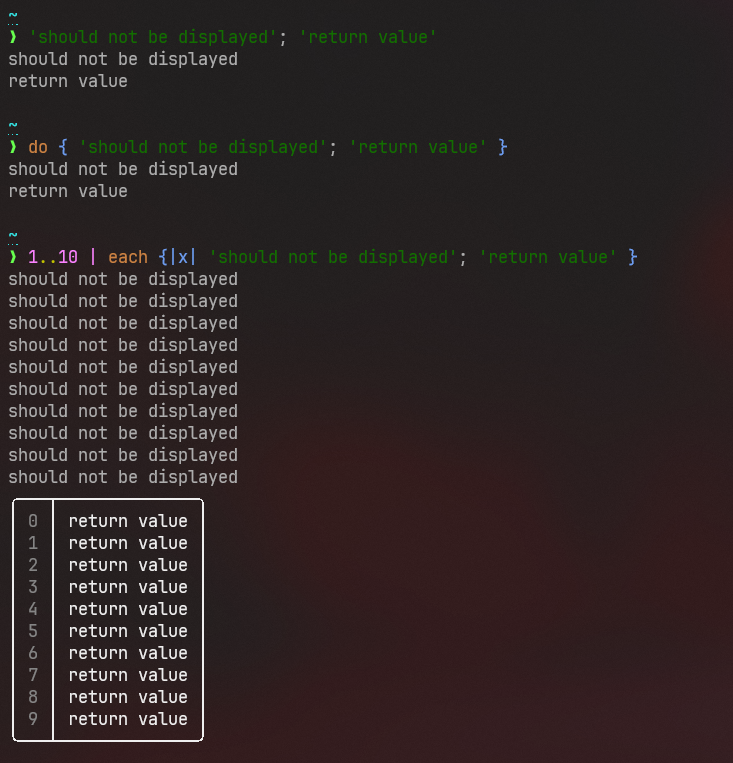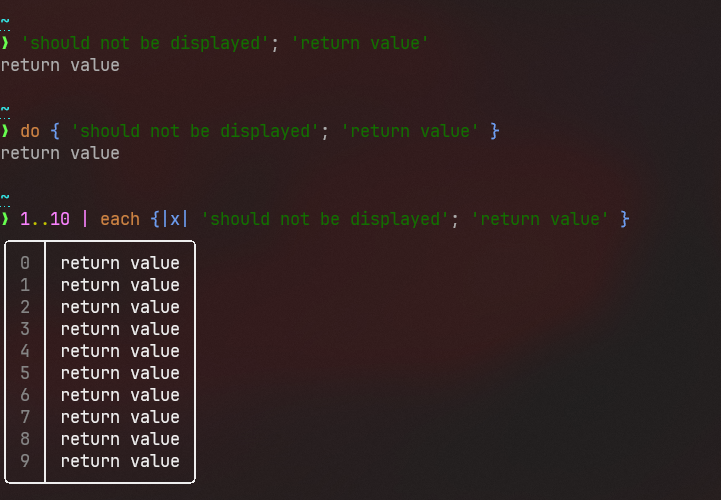# Description Change behavior of block evaluation to not print result of intermediate commands. Previously result of every but last pipeline in a block was printed to stdout, and last one was returned  With this change results of intermediate pipelines are discarded after they finish and the last one is returned as before:  Now one should use `print` explicitly to print something to stdout  **Note, that this behavior is not limited to functions!** The scope of this change are all blocks. All of the below are executed as blocks and thus exibited this behavior in the same way:  With this change outputs for all types of blocks are cleaned:  # User-Facing Changes All types of blocks (function bodies, closures, `if` branches, `for` and `loop` bodies e.t.c.) no longer print result of intermediate pipelines. # Tests + Formatting Don't forget to add tests that cover your changes. Make sure you've run and fixed any issues with these commands: - `cargo fmt --all -- --check` to check standard code formatting (`cargo fmt --all` applies these changes) - `cargo clippy --workspace -- -D warnings -D clippy::unwrap_used -A clippy::needless_collect` to check that you're using the standard code style - `cargo test --workspace` to check that all tests pass # After Submitting If your PR had any user-facing changes, update [the documentation](https://github.com/nushell/nushell.github.io) after the PR is merged, if necessary. This will help us keep the docs up to date.
255 lines
8.6 KiB
Rust
255 lines
8.6 KiB
Rust
use crate::*;
|
|
use std::{
|
|
fmt::Debug,
|
|
sync::{atomic::AtomicBool, Arc},
|
|
};
|
|
|
|
pub struct RawStream {
|
|
pub stream: Box<dyn Iterator<Item = Result<Vec<u8>, ShellError>> + Send + 'static>,
|
|
pub leftover: Vec<u8>,
|
|
pub ctrlc: Option<Arc<AtomicBool>>,
|
|
pub is_binary: bool,
|
|
pub span: Span,
|
|
pub known_size: Option<u64>, // (bytes)
|
|
}
|
|
|
|
impl RawStream {
|
|
pub fn new(
|
|
stream: Box<dyn Iterator<Item = Result<Vec<u8>, ShellError>> + Send + 'static>,
|
|
ctrlc: Option<Arc<AtomicBool>>,
|
|
span: Span,
|
|
known_size: Option<u64>,
|
|
) -> Self {
|
|
Self {
|
|
stream,
|
|
leftover: vec![],
|
|
ctrlc,
|
|
is_binary: false,
|
|
span,
|
|
known_size,
|
|
}
|
|
}
|
|
|
|
pub fn into_bytes(self) -> Result<Spanned<Vec<u8>>, ShellError> {
|
|
let mut output = vec![];
|
|
|
|
for item in self.stream {
|
|
if nu_utils::ctrl_c::was_pressed(&self.ctrlc) {
|
|
break;
|
|
}
|
|
output.extend(item?);
|
|
}
|
|
|
|
Ok(Spanned {
|
|
item: output,
|
|
span: self.span,
|
|
})
|
|
}
|
|
|
|
pub fn into_string(self) -> Result<Spanned<String>, ShellError> {
|
|
let mut output = String::new();
|
|
let span = self.span;
|
|
let ctrlc = &self.ctrlc.clone();
|
|
|
|
for item in self {
|
|
if nu_utils::ctrl_c::was_pressed(ctrlc) {
|
|
break;
|
|
}
|
|
output.push_str(&item?.as_string()?);
|
|
}
|
|
|
|
Ok(Spanned { item: output, span })
|
|
}
|
|
|
|
pub fn chain(self, stream: RawStream) -> RawStream {
|
|
RawStream {
|
|
stream: Box::new(self.stream.chain(stream.stream)),
|
|
leftover: self
|
|
.leftover
|
|
.into_iter()
|
|
.chain(stream.leftover.into_iter())
|
|
.collect(),
|
|
ctrlc: self.ctrlc,
|
|
is_binary: self.is_binary,
|
|
span: self.span,
|
|
known_size: self.known_size,
|
|
}
|
|
}
|
|
|
|
pub fn drain(self) -> Result<(), ShellError> {
|
|
for next in self {
|
|
match next {
|
|
Ok(val) => {
|
|
if let Value::Error { error } = val {
|
|
return Err(*error);
|
|
}
|
|
}
|
|
Err(err) => return Err(err),
|
|
}
|
|
}
|
|
Ok(())
|
|
}
|
|
}
|
|
impl Debug for RawStream {
|
|
fn fmt(&self, f: &mut std::fmt::Formatter<'_>) -> std::fmt::Result {
|
|
f.debug_struct("RawStream").finish()
|
|
}
|
|
}
|
|
impl Iterator for RawStream {
|
|
type Item = Result<Value, ShellError>;
|
|
|
|
fn next(&mut self) -> Option<Self::Item> {
|
|
if nu_utils::ctrl_c::was_pressed(&self.ctrlc) {
|
|
return None;
|
|
}
|
|
|
|
// If we know we're already binary, just output that
|
|
if self.is_binary {
|
|
self.stream.next().map(|buffer| {
|
|
buffer.map(|mut v| {
|
|
if !self.leftover.is_empty() {
|
|
for b in self.leftover.drain(..).rev() {
|
|
v.insert(0, b);
|
|
}
|
|
}
|
|
Value::Binary {
|
|
val: v,
|
|
span: self.span,
|
|
}
|
|
})
|
|
})
|
|
} else {
|
|
// We *may* be text. We're only going to try utf-8. Other decodings
|
|
// needs to be taken as binary first, then passed through `decode`.
|
|
if let Some(buffer) = self.stream.next() {
|
|
match buffer {
|
|
Ok(mut v) => {
|
|
if !self.leftover.is_empty() {
|
|
while let Some(b) = self.leftover.pop() {
|
|
v.insert(0, b);
|
|
}
|
|
}
|
|
|
|
match String::from_utf8(v.clone()) {
|
|
Ok(s) => {
|
|
// Great, we have a complete string, let's output it
|
|
Some(Ok(Value::String {
|
|
val: s,
|
|
span: self.span,
|
|
}))
|
|
}
|
|
Err(err) => {
|
|
// Okay, we *might* have a string but we've also got some errors
|
|
if v.is_empty() {
|
|
// We can just end here
|
|
None
|
|
} else if v.len() > 3
|
|
&& (v.len() - err.utf8_error().valid_up_to() > 3)
|
|
{
|
|
// As UTF-8 characters are max 4 bytes, if we have more than that in error we know
|
|
// that it's not just a character spanning two frames.
|
|
// We now know we are definitely binary, so switch to binary and stay there.
|
|
self.is_binary = true;
|
|
Some(Ok(Value::Binary {
|
|
val: v,
|
|
span: self.span,
|
|
}))
|
|
} else {
|
|
// Okay, we have a tiny bit of error at the end of the buffer. This could very well be
|
|
// a character that spans two frames. Since this is the case, remove the error from
|
|
// the current frame an dput it in the leftover buffer.
|
|
self.leftover = v[err.utf8_error().valid_up_to()..].to_vec();
|
|
|
|
let buf = v[0..err.utf8_error().valid_up_to()].to_vec();
|
|
|
|
match String::from_utf8(buf) {
|
|
Ok(s) => Some(Ok(Value::String {
|
|
val: s,
|
|
span: self.span,
|
|
})),
|
|
Err(_) => {
|
|
// Something is definitely wrong. Switch to binary, and stay there
|
|
self.is_binary = true;
|
|
Some(Ok(Value::Binary {
|
|
val: v,
|
|
span: self.span,
|
|
}))
|
|
}
|
|
}
|
|
}
|
|
}
|
|
}
|
|
}
|
|
Err(e) => Some(Err(e)),
|
|
}
|
|
} else if !self.leftover.is_empty() {
|
|
let output = Ok(Value::Binary {
|
|
val: self.leftover.clone(),
|
|
span: self.span,
|
|
});
|
|
self.leftover.clear();
|
|
|
|
Some(output)
|
|
} else {
|
|
None
|
|
}
|
|
}
|
|
}
|
|
}
|
|
|
|
/// A potentially infinite stream of values, optionally with a mean to send a Ctrl-C signal to stop
|
|
/// the stream from continuing.
|
|
///
|
|
/// In practice, a "stream" here means anything which can be iterated and produce Values as it iterates.
|
|
/// Like other iterators in Rust, observing values from this stream will drain the items as you view them
|
|
/// and the stream cannot be replayed.
|
|
pub struct ListStream {
|
|
pub stream: Box<dyn Iterator<Item = Value> + Send + 'static>,
|
|
pub ctrlc: Option<Arc<AtomicBool>>,
|
|
}
|
|
|
|
impl ListStream {
|
|
pub fn into_string(self, separator: &str, config: &Config) -> String {
|
|
self.map(|x: Value| x.into_string(", ", config))
|
|
.collect::<Vec<String>>()
|
|
.join(separator)
|
|
}
|
|
|
|
pub fn drain(self) -> Result<(), ShellError> {
|
|
for next in self {
|
|
if let Value::Error { error } = next {
|
|
return Err(*error);
|
|
}
|
|
}
|
|
Ok(())
|
|
}
|
|
|
|
pub fn from_stream(
|
|
input: impl Iterator<Item = Value> + Send + 'static,
|
|
ctrlc: Option<Arc<AtomicBool>>,
|
|
) -> ListStream {
|
|
ListStream {
|
|
stream: Box::new(input),
|
|
ctrlc,
|
|
}
|
|
}
|
|
}
|
|
|
|
impl Debug for ListStream {
|
|
fn fmt(&self, f: &mut std::fmt::Formatter<'_>) -> std::fmt::Result {
|
|
f.debug_struct("ListStream").finish()
|
|
}
|
|
}
|
|
|
|
impl Iterator for ListStream {
|
|
type Item = Value;
|
|
|
|
fn next(&mut self) -> Option<Self::Item> {
|
|
if nu_utils::ctrl_c::was_pressed(&self.ctrlc) {
|
|
None
|
|
} else {
|
|
self.stream.next()
|
|
}
|
|
}
|
|
}
|